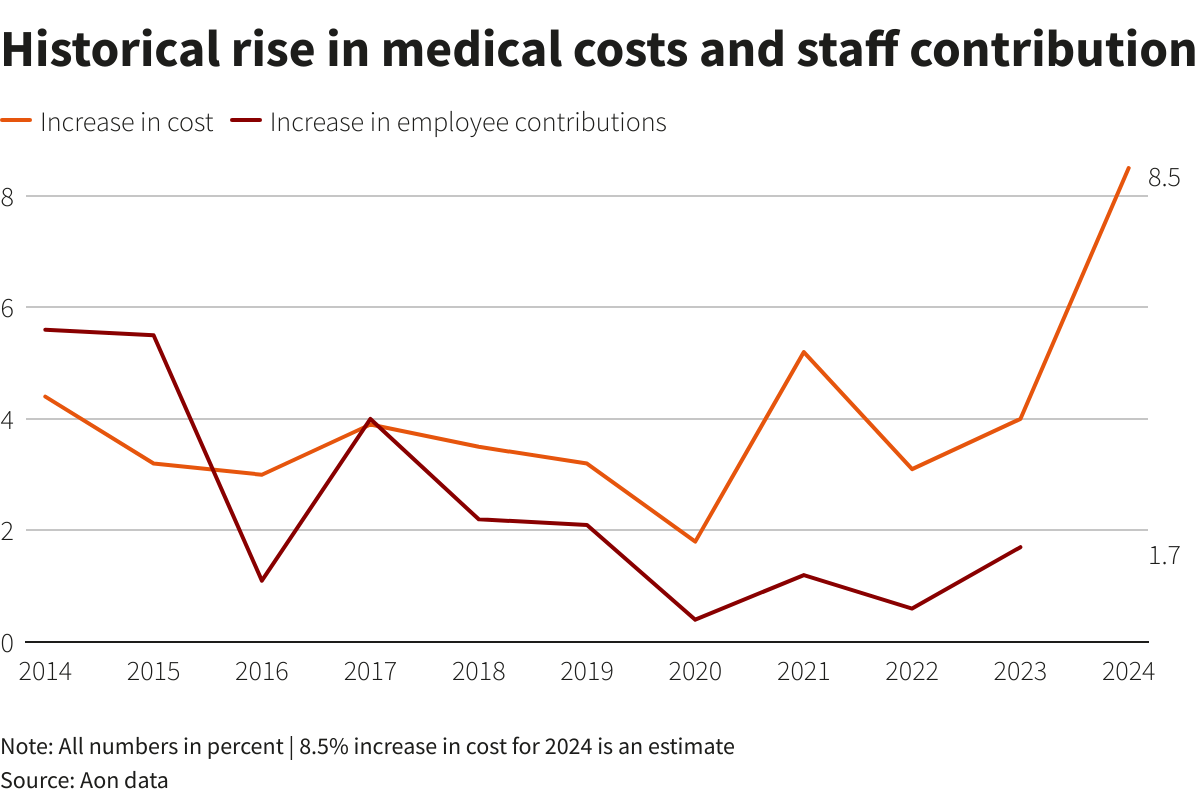The High Cost Of Mental Healthcare: Why Claims Are So Low And How To Improve Access

Table of Contents
The Financial Barriers to Mental Healthcare
The high cost of mental healthcare is a significant deterrent for many seeking treatment. Several financial barriers contribute to this problem and result in lower claim filings.
High Out-of-Pocket Costs
Deductibles, co-pays, and coinsurance represent substantial out-of-pocket expenses for individuals seeking mental healthcare. These costs can be prohibitive, particularly for those with limited incomes.
- Therapy sessions: Even a single session can cost upwards of $100-$200, quickly accumulating significant expenses before meeting a deductible.
- Medication: Prescription medications for mental health conditions can be expensive, with monthly costs ranging from tens to hundreds of dollars.
- Hospitalization: Inpatient treatment for severe mental illness can be incredibly costly, often leading to crippling debt for individuals and families.
These costs disproportionately impact low-income individuals and families, often forcing them to forgo necessary treatment due to financial constraints. The resulting lack of treatment can exacerbate existing conditions and lead to further complications down the line.
Limited Insurance Coverage
Many health insurance plans offer inadequate coverage for mental health services, creating another substantial barrier to access. This limited coverage further contributes to the low number of claims filed.
- Limited number of sessions: Some plans may only cover a small number of therapy sessions annually, leaving individuals with ongoing needs facing significant expenses.
- Restricted types of providers: Many plans only cover specific types of mental health professionals, excluding access to specialists or preferred providers.
- Employer-sponsored vs. individual plans: There are often significant discrepancies in coverage between employer-sponsored plans, which may offer better benefits, and individual plans purchased on the marketplace.
These limitations severely restrict access to vital mental health services, leaving many individuals unable or unwilling to file claims due to the anticipated out-of-pocket expenses.
Lack of Affordable Treatment Options
The scarcity of low-cost or free mental health services contributes to the issue of the high cost of mental healthcare and low claim numbers. Many individuals lack access to affordable care options, forcing them to either go without treatment or accumulate significant debt.
- Community clinics: While some community clinics offer sliding scale fees, the availability of these services is often limited by geographic location and funding.
- Sliding scale fees: These fee structures adjust the cost of services based on income, but they are not consistently available across all providers.
- Telehealth options: While telehealth offers increased accessibility, not all plans cover these services equally, and the quality of telehealth services can vary widely.
Significant geographic disparities exist, with underserved rural communities often lacking access to even basic mental healthcare services. This disparity contributes to even lower claim rates in these areas.
Systemic Issues Contributing to Low Claims
Beyond the financial barriers, several systemic issues also contribute to low claim filings for mental healthcare.
Stigma Surrounding Mental Illness
The pervasive stigma surrounding mental illness prevents many individuals from seeking help, leading to a significant underreporting of mental health conditions and fewer claims filed.
- Fear of judgment: Many individuals fear judgment from family, friends, employers, or society at large, deterring them from disclosing mental health issues.
- Lack of understanding: A lack of understanding and awareness surrounding mental illness perpetuates stigma, making individuals hesitant to seek treatment.
This reluctance to seek help directly impacts the number of claims filed, as individuals do not access the necessary care to require insurance coverage.
Navigating the Healthcare System
The complexities involved in accessing mental health services often act as a barrier, further contributing to low claim rates.
- Finding in-network providers: Locating in-network providers can be difficult, especially in certain geographical areas.
- Lengthy wait times: Long wait times for appointments can discourage individuals from seeking timely treatment.
- Confusing insurance procedures: The complexities of insurance procedures, including pre-authorization requirements and benefit verification, can be daunting.
Bureaucratic hurdles and administrative complexities in the healthcare system impede access to care and deter individuals from seeking the help they need.
Lack of Awareness and Education
A lack of public awareness regarding mental health resources and available insurance coverage contributes to low claim numbers.
- Educational campaigns: Targeted public awareness campaigns are crucial to educating individuals about available mental health resources and insurance benefits.
- Employer initiatives: Employers can play a key role in educating employees about mental health benefits and removing the stigma associated with mental illness.
- Community outreach programs: Community outreach programs can provide valuable resources and support to those in need.
Improved education and increased awareness can empower individuals to seek help and utilize available insurance benefits, thereby increasing claim filings.
Strategies to Improve Access and Reduce the High Cost of Mental Healthcare
Addressing the high cost of mental healthcare requires a multi-pronged approach focusing on several key areas.
Increasing Insurance Coverage and Affordability
Expanding mental health parity laws is crucial to ensure equitable coverage for mental health services.
- Policy changes: Legislation mandating equal coverage for mental health and physical health services needs to be implemented and enforced effectively.
- Government subsidies and financial assistance: Government subsidies and financial assistance programs can make mental healthcare more affordable for low-income individuals.
These changes will improve affordability and encourage more individuals to seek help, increasing the number of claims filed.
Expanding Access to Affordable Treatment Options
Increasing the availability of affordable mental health services is critical to improving access.
- Community-based clinics: Investing in the development of more community-based mental health clinics can expand access to affordable care, particularly in underserved areas.
- Telehealth initiatives: Supporting telehealth initiatives can bridge geographic barriers and improve access to mental healthcare services.
- Increased funding for mental health services: Increased government and private funding for mental health services is essential to support the expansion of affordable care options.
- Training more mental health professionals: Addressing the shortage of mental health professionals is crucial to meet the growing demand for care.
These initiatives will improve access to affordable care and encourage more individuals to seek treatment.
Addressing Stigma and Improving Healthcare Navigation
Combating stigma and simplifying access to mental healthcare are equally important.
- Public awareness campaigns: Launching impactful public awareness campaigns to reduce stigma is crucial to encourage help-seeking behavior.
- Educational materials: Providing easy-to-understand educational materials about mental health conditions and treatment options can reduce the fear and confusion often associated with seeking care.
- Community events: Organizing community events focused on mental health can help educate and support individuals and families.
- Online directories and streamlined insurance processes: Creating user-friendly online directories of mental health providers and streamlining insurance procedures can simplify access to care.
These strategies will improve the overall experience for individuals seeking mental healthcare and lead to higher claim filings.
Conclusion: Addressing the High Cost of Mental Healthcare and Increasing Access
The high cost of mental healthcare remains a significant barrier to access, contributing to surprisingly low insurance claim numbers. Financial barriers, systemic issues like stigma and navigating the healthcare system, and a lack of awareness all play a role. To address this critical issue, we need a multifaceted approach: expanding insurance coverage and affordability, increasing access to affordable treatment options, actively combating stigma, and simplifying healthcare navigation. Let's work together to reduce the high cost of mental healthcare and ensure everyone has access to the support they need. Learn more about available resources and how to advocate for better mental healthcare access in your community.

Featured Posts
-
 The Rise Of Wildfire Betting Examining The Los Angeles Case
May 03, 2025
The Rise Of Wildfire Betting Examining The Los Angeles Case
May 03, 2025 -
 Rust A Review Of Alec Baldwins Performance And The Films Impact
May 03, 2025
Rust A Review Of Alec Baldwins Performance And The Films Impact
May 03, 2025 -
 Fortnites 1000 Day Skin Comeback Whats Returning To The Item Shop
May 03, 2025
Fortnites 1000 Day Skin Comeback Whats Returning To The Item Shop
May 03, 2025 -
 The Future Of Rail Sustainable Travel With Wind Powered Trains
May 03, 2025
The Future Of Rail Sustainable Travel With Wind Powered Trains
May 03, 2025 -
 Boris Johnson Saviour Or Destroyer Of The Conservative Party
May 03, 2025
Boris Johnson Saviour Or Destroyer Of The Conservative Party
May 03, 2025
